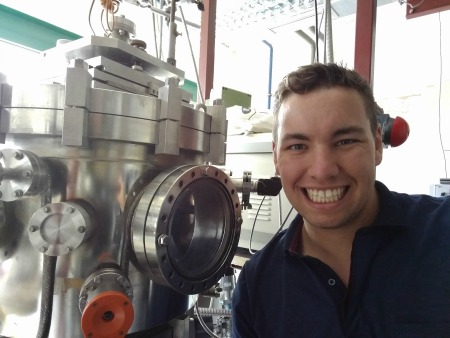
After cutting his teeth on space industry in Germany, Max King is shooting for the stars.
(EDMONTON) Max King (Materials [Co-op] '17) just graduated but, as a co-op student and an active volunteer, he has already amassed quite a lot of experience. And he can easily name the work that has impacted him the most.
"The highlight of my degree would be going to Germany for my last co-op term," he says "I was working with the Deutsches Zentrum für Luft und Raumfahrt - that's the German Aerospace Centre."
King's ultimate goal is to work for NASA, so the eight-month term in Cologne was directly applicable. "It was my first big break, a real opportunity. My instructors, particularly Professor Henein, were really supportive."
In Cologne, King worked on a project looking at how materials solidify in microgravity, without convection. These are conditions similar to what astronauts would experience aboard the International Space Station.
"I worked building an electromagnetic levitator, specifically miniaturizing it. We wanted to be able do the same kind of testing that we would do at zero gravity," King says. Miniaturizing the equipment can create conditions analogous to the microgravity of the space station. "It's cheaper easier to do-not as perfect as true microgravity, but making it smaller would make it behave more like similar experiments on the space station."
If he could do it, anyway.
In Cologne, King studied the project work of two students who came before him to work on the same problem but who had ultimately been unsuccessful. "It took a lot of critical thinking. And I looked over the work of the student before me, and the one before that. They'd both tried the same thing, so I knew what not to try."
King took a different approach, addressing a persistent problem: the device kept melting. He pumped cool water through it, but the water spent too much time in the tubing of the device. "The water was down in the tubes for too long, and it got too hot. So I managed to do more with less-I made some of the pipes smaller, avoiding the problem."
"Then I built a prototype and it worked," he says, a huge grin spreading across his face. "And hopefully someone's working with that prototype now."
In addition to King's experience in Germany, he also had co-op terms roadbuilding in Fort McMurray and designing natural gas piping in Edmonton with Atco Gas. "My plan for next year is doing a master's in Toronto in aerospace engineering," he says. "I want to work in a group that designs and builds satellites, hopefully getting me closer to NASA."
King says in consideration of space travel and satellite-building, weight is everything. The goal is to create nimble designs that can independently or collectively carry out various functions. "You can have them do anything from monitoring shipping traffic to greenhouse gas emissions," he says. "Some are even used for astronomical purposes." He points to the Hubble Space Telescope, which is incredibly impactful for discovery but its scale-and price tag-are massive. "The ability to have hundreds of small satellites that are cheap to make really helps us keep costs down and the technology current."
King is also active in outreach. He has worked with groups of elementary school students, doing demos in the classroom and has also volunteered for several years at the Telus World of Science in Edmonton in its observatory. "You get all educational backgrounds, all types of people coming in, all ages," he says. "It's so much fun and it taught me a lot."
"If I had if I had advice for people going in I'd say to get involved. I was in the University of Alberta mixed chorus choir. Don't be afraid to join clubs that are outside the engineering realm. And get involved outside the university as well."
But he's looking forward to rejoining the ranks of engineering students in the fall, doing a master's in aerospace and keeping his eye on the future. Who knows? Maybe he'll find himself on a future list to become Canada's next astronaut.
He laughs, then looks a little serious. "Don't jinx it," he says.